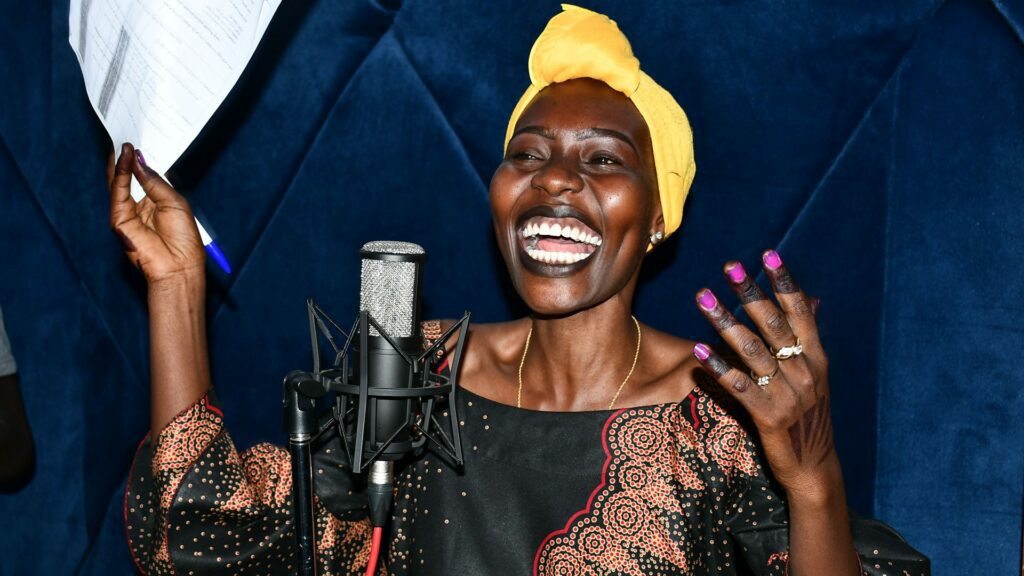Dimo Silva
Radio Training Coordinator, South Sudan
Twelve years after South Sudan gained independence, it still faces armed violence in some areas, endemic poverty, flooding and other disasters. Against this backdrop, audiences are excited to hear that our radio drama, Life in Lulu – a portrait of the village everyone aspires to – is returning!
Life has changed over time in the fictitious rural village of Lulu, the setting of our flagship series. Over more than 10 years, the drama has built a track record of influencing change for the better around health, governance, peace-building and conflict resolution within local communities.
Now, Life in Lulu returns with a new focus – engaging youth in civic life, and addressing gender-based violence.
These reflect some of the challenges faced by young people in South Sudan, with conflict, high rates of unemployment and limited economic opportunities, which, in turn, take a toll on the rights of women and girls and the incidence of sexual- and gender-based violence. In addition, South Sudan is expected to hold its first ever general election this year; the UN has warned that authorities need to ensure ‘peaceful, inclusive and credible elections’.
A ‘village we all aspire to see’
There are some changes in Lulu: It still has its green and yellow maize farms, and circular thatched homes. But the village has now been elevated to a ‘payam’, the second tier of local government, along with neighbouring villages, headed by a civil administrator.
Lulu now has its own radio station, and a new youth centre, where young people can socialize and discuss community matters.
Characters for change
Our longstanding characters Malish, Nyamal, and Faida, all strongly believed in good decision-making throughout the first eight seasons, and continue to do so in this season. This season will focus on challenging behaviours that are widely accepted as normal in most South Sudanese communities, around the role of young people and the prevalence of gender-based violence. Our new young characters will take part in matters affecting their lives and their communities and participate in decision-making.
“We are trying to create our drama at the interface between an older generation who thinks South Sudan is changing too fast and a younger generation who thinks it is not changing fast enough,” says Ian Masters, BBC Media Action’s drama consultant. “What we try to achieve is to represent real problems and issues that communities face but then dramatise aspirational solutions to them.”
Creating storylines is one of the most important steps in drama production; our pool of producers and actors spend weeks to envision the characters’ lives and roles in the drama – making sure the stories are relevant and easily understood by listeners.
The character Nyamal, who is currently chief of Lulu and executive chief of the new payam, will return in this season, as does Majak, Nyamal’s rival and the series antagonist. Young man Lokochong, who in the previous series studied journalism in nearby Anzomo town, also returns, setting up a radio station to dispel rumors and misinformation that have been causing problems in Lulu village.
A peaceful and inclusive future
Through the storylines, Life in Lulu will create a sense of belonging for young people, and participation in matters affecting their communities. Young characters Albino and Sarah hold their leaders accountable and demonstrate their right to choose their leaders through a democratic process, helping to inspire real-life participation by young people.
“What is impressive about Life in Lulu is the continuity and adaptivity to current issues affecting people in South Sudan, all of which are vividly reflected by the lives of people of Lulu,” said Dhieu Abraham, scriptwriter for Life in Lulu.
We know from endline research that Life in Lulu has impact: our 2023 impact survey found that 80% of Life in Lulu’s regular listeners have acted to resolve conflict peacefully.
“I was influenced by my friends to go for a revenge attack with a ‘panga’ [machete] or sword, but because of listening to the Life in Lulu programme, I learned that problems are to be solved non-violently and I refused. This saved me from that terrible act.” A young man from Yambio shared his experience with our researchers his story during a focus group discussion.
We are producing 80 episodes in six languages – Toposa, Murle, Arabic, Dinka, Shiluk and Nuer – over the next two years, and a 10-part drama skit based on a fictitious Life in Lulu listener, ‘Madam Smart’. She picks up on real-life issues raised in the drama by talking about them in her tea shop; for example, one of her customers might condone gender-based violence, and Madam Smart might then reinforce suggestions from the Life in Lulu episode or use it to condemn the behaviour.
The programmes will be broadcast across 26 partner radio stations – covering all 10 states and most of the country with access to radio. For ‘media-dark’ areas, ie rural zones that have no signal or where people cannot afford radios, we will be creating listener groups, with discussions led by community volunteers.
Branching into social media
Life in Lulu is now also moving into social media, with the aim of expanding our current reach of 1.4 million people and reaching more young people.
Our newly formed digital team will be sharing content in different formats on Facebook, offering a new space for young people to engage with the issues depicted in the show. We can’t wait to harness the power of storytelling in a new way for Life in Lulu.
It will be back on air soon – stay tuned!
—
Life in Lulu is funded by Norwegian Ministry of Foreign Affairs until 2025. Learn more here.
Check out our two Meta pages in South Sudan: Life in Lulu and BBC Media Action South Sudan.
Source link : https://www.bbc.co.uk/mediaaction/where-we-work/africa/south-sudan/lifeinlulu2024
Author :
Publish date : 2024-04-25 07:00:00
Copyright for syndicated content belongs to the linked Source.
